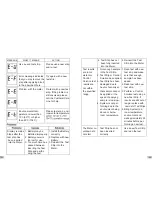
AST in this system can be used only during steady-state blood
glucose conditions described in the section of “About AST”.
Test principle
The test is based on the measurement of electrical current gen-
erated by the reaction of glucose with the reagent of the strip. The
meter measures the current and displays the corresponding blood
glucose level. The strength of the current produced by the reaction
depends on the amount of glucose in the blood sample.
ABOUT ALTERNATIVE SITE TESTING (AST)
Important: There are limitations for doing AST.
Please consult your healthcare professional before you do AST.
What is AST ?
Alternative site testing (AST)
means that people use parts of the
body other than the fingertips to
check their blood glucose levels.
This system allows you to test on
the palm or the forearm with the
equivalent results to fingertips
testing.
Fingertips feel pain more readily because they are full of nerve
endings (receptors). At other body sites, since nerve endings are
not so condensed, you will not feel as much pain as at the fingertip.
Food , medication , illness, stress and exercise can affect blood
glucose levels. Capillary blood at fingertip reflects these changes
faster than capillary blood at other sites. Therefore when testing
blood glucose during or immediately after meal, physical exercise,
or any other event, take a blood sample from your finger only.
You do AST
in the following instances:
●
In a pre-meal or fasting state (more than 2 hours since the
last
meal).
●
Two hours or more after taking insulin.
●
Two hours or more after exercising.
■
Alternative site testing(AST) should not be used to calibrate
continuous glucose monitoring systems (CGMs).
■
Results from alternative site testing should not be used in
insulin doses calculations.
●
You think your blood glucose is low.
●
You are unaware of hypoglycemia.
●
You are testing for hyperglycemia.
●
Your AST results do not match the way you feel.
●
Your routine glucose results are often fluctuating.


























